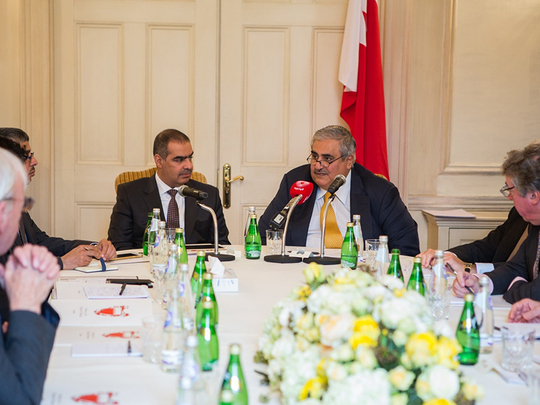
Manama: Iran’s nuclear deal with six world powers in July does not address the real problems in the region and focuses on only one issue, Bahrain’s foreign minister has said.
“The agreement between Iran and the 5+1 group on the Iranian nuclear programme in July 2015 does not eliminate all sources of tension resulting from Iran’s attitude towards the countries of the region,” Shaikh Khalid Bin Ahmad Al Khalifa said. “It does not address the real problems but focuses on only one issue, since Iran still interferes in the internal affairs of neighbouring countries, fuelling unrest and destabilization in the region,” he said as he took part in the round table "Defense and Foreign Policy of the GCC States post the Joint Comprehensive Plan of Action” organised by Bahrain’s embassy in the United Kingdom.
“Despite the fact that we are still looking forward to the agreement contributing to the security and stability of the region, until now we that the deal touches only one of the future problems and ignores the real issues of the present time. Iran is still working through every illegal and illegitimate manes to destabilize the security and peace of the region,” he said.
Shaikh Khalid referred to the recurring flagrant Iranian interference in the internal affairs of Bahrain and its exploitation of extremist groups, the provision of safe haven for fugitives and the opening of training camps for terrorist groups, smuggling arms and explosives in quantities that are enough to demolish entire cities.
The latest of these plots was the attempt to smuggle large quantities of weapons and explosives that amounted to 1.5 tons, of highly explosive material destined for use in the manufacturing of such potent explosives as C4, RDX and TNT, the minister said, adding that “the criminal targeting of citizens, residents, and security forces has claimed 16 lives among security personnel and injured 3,000 others.”
Shaikh Khalid reaffirmed the importance of a nuclear free zone in the Middle East, including the Arabian Gulf region, and the necessity for Israel to adhere to the Treaty on the Non-proliferation of Nuclear Weapons and to place its nuclear facilities under comprehensive International Atomic Energy Agency safeguards.
The minister said that Bahrain and other fellow Gulf Cooperation Council (GCC) countries were providing support to Yemen in response to a request by President Abd Rabbuh Mansur Hadi “to curb the deterioration of the security and humanitarian situation in the face of rebel groups who are benefitting from Iranian support and who laid their hands on the institutions of the state and spread strife and chaos in Yemen.”
The military confrontation was inevitable and there was no other choice since all options were blocked by the obstinacy of the rebel groups and their belligerent designs for the people of Yemen, he said.Shaikh Khalid said the GCC was committed to advocate and support Yemen until the fulfillment of the aspiration of Yemeni people for security, stability, progress and prosperity.
He said all parties needed to engage in a constructive national dialogue on the basis of the GCC initiative and its implementation mechanism, as well as the outcome of the comprehensive national dialogue and the Riyadh Conference, and the unconditional implementation of Security Council Resolution 2216.
In remarks about the GCC foreign and defense policies, Shaikh Khalid stressed the necessity of continuing to diversify regional and international alliances with emerging international powers particularly the East Asian countries and India.
Such a drive is no longer merely one of the objectives of the foreign policy of the GCC, and it has now become a collective strategic choice imposed by the political, economic, and geostrategic reality, he said,
The GCC choice is based on the long-term strategy to achieve the vital interest of the GCC states and to contribute to both the achievement of the aspirations of Gulf people for comprehensive development in all fields and the consolidation of peace and security of the region, he said.
The minister said robust pillars for the success of such a strategic stance included the shared cultural and civilization heritage among GCC states and the increased interrelated economic development in both the Asian countries and the GCC states, as well as the presence of a considerable number of Asian expatriates in the GCC countries who are qualified to bridge the gap between East and West Asia, geographically and strategically.
The GCC, established in 1981, comprises Bahrain, Kuwait, Oman, Qatar, Saudi Arabia and the UAE.
Talking about the situation in Syria, Shaikh Khalid said he deeply regretted the devastation that has afflicted the country and transformed it into a battlefield for confrontation between terrorist organizations, such as Daesh and Hezbollah.
The minister stressed the need to reach a political solution accepted by all parties and consistent with the communiqué of the Geneva 1 conference that allows Syria to restore its unity, stability and prosperity.
Shaikh Khalid said the GCC countries were deploying great efforts to help the Syrian refugees and displaced people, and had taken a comprehensive and practical humanitarian action by hosting around three million Syrians and granting them permits to stay as well as the rights to free education and healthcare as well as the right to employment and to a decent life.
On the developments in Iraq, Shaikh Khalid expressed hope for the success of the efforts exerted by Prime Minister Haider Al Abadi to unite the Iraqi people, restore security and peace, put an end to the foreign interferences, as well as preserve Iraq’s territorial integrity.












